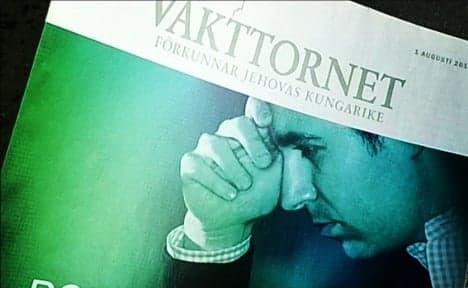Jehova's witness loses Swedish tax fight

More than a hundred Jehova's Witnesses in Sweden face paying income tax on the free room, board and pocket money they receive as residents at the religion's Swedish headquarters.
While a person living in a convent or monastery with no duties beyond his or her membership in that religious community has not needed to pay tax in Sweden, a new ruling has said about one hundred Jehova's Witnesses living in Arboga should be considered as employed.
"With the very broad definition of what constitutes employment nowadays, the circumstances cannot, according to the Tax Committee (Skatterättsnämnden), be judged in any other way than the commitments are to be considered employment," stated Sweden's Justice Chancellor (Justitiekanslern - JK), which upheld both the tax agency's and an administrative court's earlier rulings.
The lawyer representing his fellow Jehova's Witnesses had referred the case on to the Justice Chancellor because he believed that having to pay income tax on housing, board, and pocket money violated their rights as defined by the European Convention on Human Rights. In particular, the congregation referenced articles nine, the right to freedom of thought, conscience and religion, and 14, the prohibition of discrimination.
The Swedish Justice Chancellor ruled, however, that there had been no religious discrimination.
The lawyer at the centre of the dispute had double-checked with Sweden's tax authorities in 2009 to see if the residents at the centre were exempt from income tax. Due to a perceived lack of clear legal precedent, the case was looked at by Skatterättsnämnden, a state agency linked to the finance ministry that issues binding recommendations in cases where neither legislation nor previous cases shed light on how to proceed.
The committee members ruled that the Jehova's Witnesses living at the centre were not exempt. One committee member objected to that ruling, however, stating that he considered that the plaintiffs' living circumstances were similar enough to living in a nunnery or monastery. Nuns and monks have so far been exempt from income tax duties, although the committee member also noted that Swedish tax law had been updated and no one had taken a look at the tax situation of the monasteries under current law.
"There is an established administrative precedent," the committee member argued. "As long as the person's situation and income are comparable to situations that have previously been covered by that administrative precedent, he has a right to be treated the same way in terms of taxes."
Comments
See Also
While a person living in a convent or monastery with no duties beyond his or her membership in that religious community has not needed to pay tax in Sweden, a new ruling has said about one hundred Jehova's Witnesses living in Arboga should be considered as employed.
"With the very broad definition of what constitutes employment nowadays, the circumstances cannot, according to the Tax Committee (Skatterättsnämnden), be judged in any other way than the commitments are to be considered employment," stated Sweden's Justice Chancellor (Justitiekanslern - JK), which upheld both the tax agency's and an administrative court's earlier rulings.
The lawyer representing his fellow Jehova's Witnesses had referred the case on to the Justice Chancellor because he believed that having to pay income tax on housing, board, and pocket money violated their rights as defined by the European Convention on Human Rights. In particular, the congregation referenced articles nine, the right to freedom of thought, conscience and religion, and 14, the prohibition of discrimination.
The Swedish Justice Chancellor ruled, however, that there had been no religious discrimination.
The lawyer at the centre of the dispute had double-checked with Sweden's tax authorities in 2009 to see if the residents at the centre were exempt from income tax. Due to a perceived lack of clear legal precedent, the case was looked at by Skatterättsnämnden, a state agency linked to the finance ministry that issues binding recommendations in cases where neither legislation nor previous cases shed light on how to proceed.
The committee members ruled that the Jehova's Witnesses living at the centre were not exempt. One committee member objected to that ruling, however, stating that he considered that the plaintiffs' living circumstances were similar enough to living in a nunnery or monastery. Nuns and monks have so far been exempt from income tax duties, although the committee member also noted that Swedish tax law had been updated and no one had taken a look at the tax situation of the monasteries under current law.
"There is an established administrative precedent," the committee member argued. "As long as the person's situation and income are comparable to situations that have previously been covered by that administrative precedent, he has a right to be treated the same way in terms of taxes."
Join the conversation in our comments section below. Share your own views and experience and if you have a question or suggestion for our journalists then email us at [email protected].
Please keep comments civil, constructive and on topic – and make sure to read our terms of use before getting involved.
Please log in here to leave a comment.